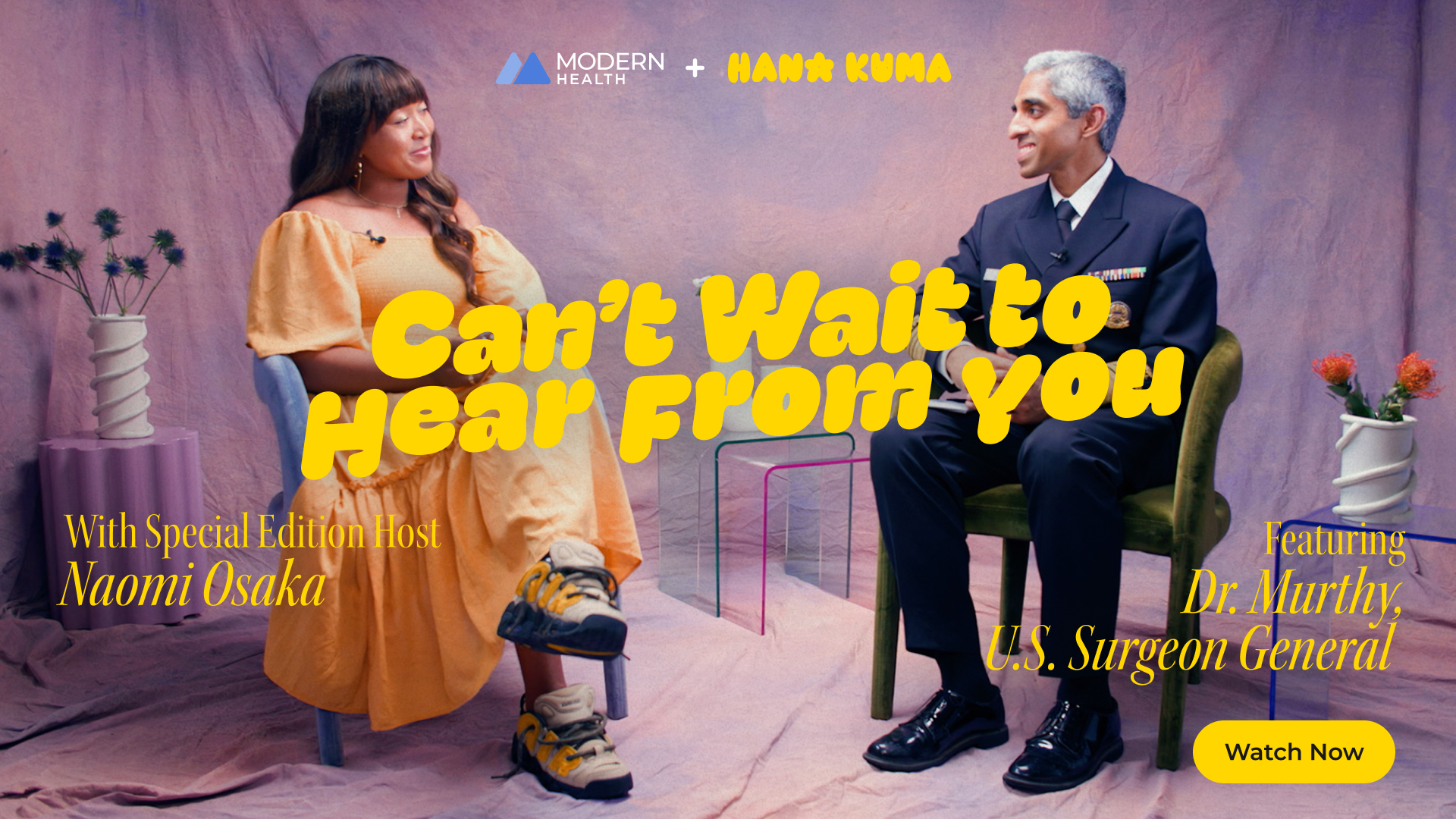
Relationships and Outcomes
Examining therapeutic relationships and well-being outcomes in a virtual setting
In recent years, the importance of access to high-quality mental health care has reached an all-time high. Apart from the ongoing COVID-19 pandemic, stressors like a contentious political climate, racial unrest, and a worsening economy have people stressed, burned out, and on edge. According to the Kaiser Family Foundation, about 40% of U.S. adults reported symptoms of anxiety or depression during the pandemic, up from roughly 10% pre-pandemic.The workplace has changed dramatically since the start of the pandemic, and companies are increasingly offering mental health benefits with access to virtual care to reduce employee burnout and improve well-being. Research from Modern Health and Forrester Consulting has found that employees find great value in these benefits, with 73% of employees and 81% of managers indicating that they would be more likely to stay at a company that offers high-quality mental health resources.
Virtual care shifts the setting of one-on-one care from in-person to videoconferencing meetings or phone calls and can provide easy and equitable access to care for people worldwide. But is virtual care as effective in terms of client relationships and well-being outcomes? As an industry-leading organization that provides virtual mental health benefits to over 330 companies, we wanted to find out.
Therapeutic alliance study background and methodology
We recently conducted a peer-reviewed study in the Journal of Technology in Behavioral Science that examined data from 3,087 Modern Health users during the COVID-19 pandemic. These participants received one-on-one care with a provider in the form of teletherapy, telecoaching, or both modalities between September 2020 and October 2021. The study set out to:
- Evaluate participant ratings of therapeutic alliance with coaching and therapy providers in a virtual setting. Therapeutic alliance is the working relationship between the provider and the client in a one-on-one care setting. A client and provider’s therapeutic alliance includes qualities like trust and personal affection, whether the relationship is collaborative, and whether the two feel they are working on agreed-upon goals. After each session with a provider, participants were given the option to complete two adapted items from the clinically validated Working Alliance Inventory: “I am confident in [my provider’s] ability to help me” and “[My provider] and I are working on agreed upon goals.” Participants responded to both questions on a scale of 1 (“Strongly Disagree”) to 5 (“Strongly Agree”), and their therapeutic alliance rating was computed by averaging the response to both items.
- Examine changes in subjective well-being and depressive symptoms among virtual coaching and therapy participants who screened positive for depressive symptoms at baseline. The WHO-5 was used to assess well-being and depressive symptoms before and after care. The WHO-5 is a five-item unidimensional assessment of psychological well-being that asks the participant about their mental well-being over the previous two weeks with questions like “I have felt cheerful and in good spirits” and “I have felt calm and relaxed.” Answers are ranked on a six-point scale from 0 (“At no time”) to 5 (“All of the time”). Scores are summed and multiplied by 4, giving a total range of 0–100. This assessment is also used to measure depressive symptoms. Clinical recovery from depressive symptoms is defined as a score on the WHO-5 changing from below to above the clinical cut-off score of 28.
- Explore the association between therapeutic alliance and changes in participants’ well-being. To understand whether therapeutic alliance is a key ingredient of successful mental health care, we did an analysis to see if participants’ ratings of alliance with their provider were correlated with improvements in well-being.
Therapeutic alliance study results
Here is a summary of our findings, along with insights to consider if you’re looking to implement a full-scale mental health benefits provider like Modern Health at your organization:
Participant-rated therapeutic alliance scores were high
We found that participants formed a strong bond and mutually agreed-upon goals with coaches and therapists. In fact, 90% of Modern Health members were confident in their certified coach or licensed therapist's ability to help them and work on agreed-upon goals. And this was consistent across participant age groups, countries, and starting levels of depression. Participants utilizing telecoaching alone actually reported alliance scores that were just as strong (4.83/5) as those utilizing teletherapy alone (4.75) or both modalities (4.75).
Insights for your organization:
- If you plan to offer mental health benefits at your organization, Modern Health's virtual care format may have therapeutic alliance advantages over in-person care. The virtual format may create a more neutral and collaborative environment by facilitating care in a familiar setting for the client. It may also provide a greater sense of intimacy and personal control, leading to increased client comfort and investment in care.
- Modern Health is the only solution to guide all employees to the right resources for their needs and preferences, and many people who need support for their mental health don’t require clinical-level therapy. We are committed to offering coaching to help fill this gap and are thrilled to see that therapeutic alliance was just as strong between clients and their coaches as it was between clients and their therapists. Our certified coaches provide care comparable to therapy for people with moderate mental health care needs.
Well-being scores significantly improved over the course of treatment
Throughout the study period, participants with elevated depression symptoms reported an average WHO-5 increase from baseline to follow-up of 15.42 points, which constitutes a 76% improvement in well-being overall. And 58% of participants experienced clinical recovery after working with a provider. These improvements were similar between participants utilizing teletherapy and telecoaching — a promising result given the growing need for professional coaches who provide non-clinical support.
Insights for your organization:
- When your employees thrive, your organization benefits — they perform better, take fewer sick days, and have a better sense of belonging. Focusing on well-being leads to happier employees and an improved bottom line, and instituting well-being benefits is quickly becoming necessary in today’s marketplace. Modern Health offers a solution that drives workforce engagement, satisfaction, and well-being outcomes that are cost-effective for your organization.
- Implementing a benefit like Modern Health with a demonstrated ability to improve employee well-being can reduce turnover and save your organization money. Keep in mind that it costs an employer an average of six to nine months’ salary to replace an employee who leaves.
Higher therapeutic alliance scores were associated with greater well-being following one-on-one care
Among participants who had higher depressive symptoms at baseline, higher therapeutic alliance scores were significantly correlated with greater well-being at follow-up after accounting for baseline levels of well-being and other demographic characteristics. This finding contributes encouraging evidence that clients and providers can establish high-quality therapeutic relationships that improve outcomes in virtual settings.
Insights for your organization:
- Results suggest that Modern Health’s personalized care recommendations, which help connect employees with the right provider, may create beneficial bonds that promote strong outcomes. Modern Health uses responses to a clinically-validated self-assessment to put together a personalized care plan and match your employees with a coach or therapist if needed.
- Providers are gaining confidence that they can create a collaborative relationship that supports clients when they are face-to-face but not physically in the same space. This growing confidence in virtual mental health care has allowed Modern Health to build an impressive network of providers in over 55 countries and 50 languages. With such a wide range of providers, your employees can easily find a coach or therapist they relate to with a similar cultural background.
If you want to evaluate your benefits to see if there’s room for improvement or learn more about Modern Health, contact us to connect with one of our benefits experts today.
Sara Sagui-Henson, PhD
Dr. Sara Sagui-Henson is a behavioral scientist at Modern Health.

.jpg)

